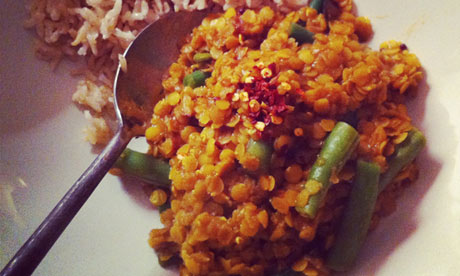
For the first time since university I am on a diet. Somehow, I've become a calorie-counter, someone who weighs out porridge oats and drinks herbal tea. In other words, the kind of person I've always pitied.
The thing is, I'm actually quite enjoying it – enjoying being a relative term, of course. In an ideal world, I'd boast the kind of robust metabolism that laughs in the face of cooking six bakewell tarts an afternoon, but I don't. And since I started my Perfect recipe column a couple of years ago, I've noticed the pounds slowly creeping on. There's a lot to love about my job, but it does make it almost impossible to eat healthily.
The fasting diet, otherwise known as the 5:2 because of the format – five days of normal eating a week and two in which you restrict your calories (500kcal for women, 600kcal for men) – seemed to offer a glimmer of hope for my hips. It's basically the diet for people who like food. Everyone from Hugh Fearnley-Whittingstall to wine writer Fiona Beckett has been boring on about fast days, and if they could do it, well, so could I.
So far, I've managed two months. As someone who's never made a habit of weighing themselves, I can only tell you that I think I've lost about 10lb since I started, which includes a two-week period over Easter where I gave myself a bit of a break, but only put back on 1lb.
The odd thing was, after Easter I was impatient to get going again. The 5:2 already feels like a long-term project. It's not difficult to stick to either. After all, if you really want a biscuit, you can always have one tomorrow – a thought I find extremely cheering.
Many people I've spoken to seem to avoid cooking at all on a fast day, reasoning perhaps that it simply puts temptation in their way. Indeed, in her book, the Fast Diet, co-authored with Dr Michael Mosley, whose 2012 BBC Horizon programme on fasting kickstarted interest in the idea, Mimi Spencer advises preparing food in advance, and keeping it simple, "aiming for fast-day flavour without effort".
I couldn't disagree more. For me, the challenge of devising satisfying recipes that fit within the daily 500-kcal limit has kept fast days interesting, and frankly, if you're only going to be eating two small meals a day, heating them up in the microwave makes things even more depressing. Here are a few tips I've found useful so far, and three of my favourite fast-day recipes …
• Low-calorie cooking is all about strong flavours: pungent spices, zesty lemon juice and salty soy sauce will all help to distract your attention from the missing calories, as will lots of garlic and big handfuls of fresh herbs.
• Don't be too hard on yourself. Usually I sniffily avoid artificial sweeteners, but a cold glass of slimline tonic with a slice of lime and plenty of ice goes down a treat when everyone else is glugging wine. I've even been known to indulge in a low-calorie pot of jelly when I'm feeling particularly wild.
• Carbs are rarely worth the calories. A paltry 50g of brown rice takes up over a third of your daily calorie count. Save them for tomorrow and fill up on vegetables and berries instead.
• Pickles such as gherkins (14kcal per 100g) and miso soups (20-30kcal a cup) are your friends for snacks.
• Drink lots. Sparkling water, evil diet drinks and weird and wonderful teas will keep you occupied mid-afternoon.
• Embrace your inner nerd and invest in a set of electronic scales and a calorie-counting book or app, or you'll find it impossible to measure your intake accurately.
Sweet spiced porridge
(Serves 1, 202kcal)
40g porridge oats
Grating of nutmeg
Pinch of cinnamon
Pinch of salt
5g mixed peel
10g currants
Put the oats into a small pan with about twice as much water. Heat gently and stir until they're thick and creamy. Add more water if you prefer them runnier. Season with nutmeg, cinnamon and a pinch of salt. Stir in the mixed peel and currants and spoon into a bowl.
Roasted broccoli, garlic and chilli soup
(Serves 2, 200kcal each)
600g broccoli (2 medium heads)
4 cloves of garlic, unpeeled
1 tbsp olive oil
1 tsp chilli flakes
600ml chicken or vegetable stock
1 unwaxed lemon
10g grated parmesan
Preheat the oven to 200C. Cut the broccoli into florets and chop the stalk into large chunks. Put in a baking dish with the garlic and toss well with the olive oil, chilli and some coarse sea salt. Roast for about 20 minutes until tender and the broccoli florets are beginning to char. Put the chunks of stalk in a food processor, along with the larger florets. Squeeze the garlic from its skin and add to the stock. Whizz until smoothish. Pour into a pan and reheat, diluting slightly if you prefer a thinner soup. Grate in the zest of half a lemon and add a squeeze of juice. Season to taste. Spoon into bowls, and top with the remaining florets, and parmesan. Serve immediately.
Frozen yoghurt with berries
(Serves 1, 120kcal or 100kcal without the honey)
150g frozen berries
100g fat-free Greek yoghurt
1tsp honey (optional)
Blend half the berries with the yoghurt in a food processor until smooth. Add the honey and whizz again, then taste and add a little more lemon if necessary (you can also add more honey, but bear in mind each teaspoon adds 20kcal). Scoop into a bowl or glass and top with the remaining berries.

